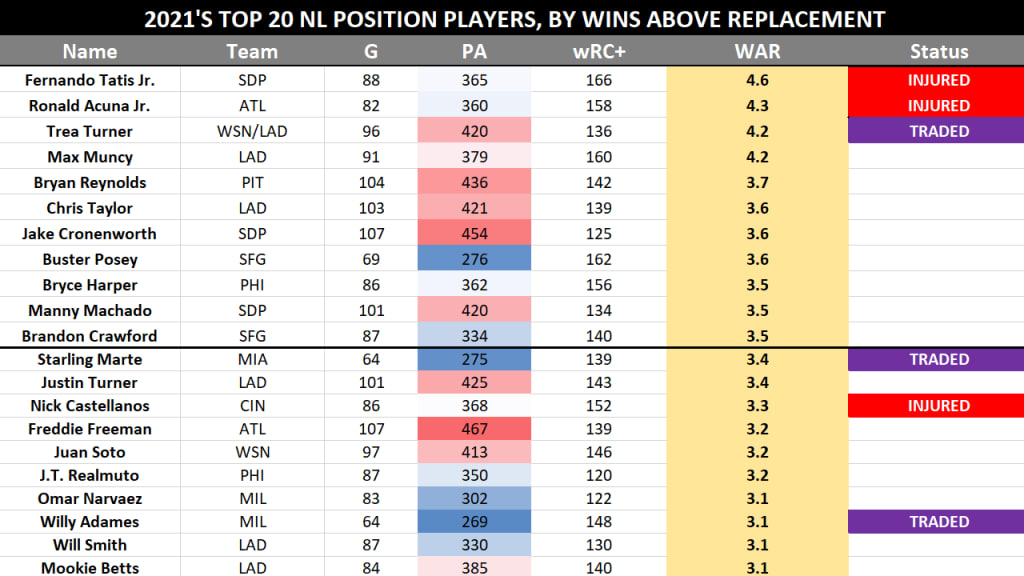You wouldn¡¯t think it would be possible for Bryce Harper, of all people, to do anything quietly, or under the radar.
After all, if there were a way to quantify ¡°most career hype,¡± well, you could do a lot worse than pointing to the guy who was on the cover of Sports Illustrated as a teenager, then was picked No. 1 overall, then won the 2012 Rookie of the Year, then was named the 2015 Most Valuable Player, and then signed a 13-year-deal with the Phillies -- among 100 other things.
Maybe it¡¯s because the Phillies, thanks largely to a flammable bullpen, are two games under .500 in his three years there. Maybe it¡¯s because the next crop of highly touted superstars, like Juan Soto and all the famous sons of famous fathers, has arrived to gain well-earned attention. Maybe it¡¯s because we all can¡¯t stop staring at Shohei Ohtani, understandably, or because Harper's RBI total is low, thanks largely to his teammates. There are plenty of ways to explain why Harper isn¡¯t quite in the spotlight like he once was.
Those reasons might be understandable, yet they all make it far too easy to miss what he¡¯s doing. Harper has a .306/.417/.557 line, a year after putting up a .268/.420/.542 line, making him a top-6 hitter over the past two seasons. He has the third-best OBP in 2020-21; he has the eighth-best slugging.
Harper is one of just four hitters to have a .400 OBP / .500 SLG combo this year, after being one of just eight hitters to do it last year; combine 2020-21, and the only three such studs are Soto, Freddie Freeman ¡ and Harper. Looking at his career numbers, there have been nearly 700 players to take at least 5,000 plate appearances since integration in 1947, and his offensive performance to date is tied for 30th best (understanding, of course, he hasn¡¯t reached his thirties yet.)
He¡¯s lived up to the hype, and then some, so don¡¯t be terribly surprised when we put this unexpected hypothesis out there: Two months from now, Harper could be your National League MVP.
OK, let¡¯s back up for a second. Part of the reason we¡¯re able to even suggest this is because every other seeming frontrunner for the award has seen a roadblock thrown in his way.
Think about the big stars in the NL, and what¡¯s happened to them.
Fernando Tatis Jr. is again sidelined by a shoulder injury that may require surgery. Ronald Acu?a Jr. is out for the year with a knee injury. That might have opened the door for Jacob deGrom, except he¡¯s been out for a month with an elbow injury and may or may not return this season. Nick Castellanos has been out for weeks with a wrist injury. Trea Turner is currently on the COVID-19 list and the trade to the Dodgers essentially ends his candidacy anyway; no MVP has ever won the award in a season in which he was traded.
That doesn¡¯t even account for the names you might have expected entering the season. Francisco Lindor¡¯s Mets debut was underwhelming, and now he¡¯s injured. Cody Bellinger, the 2019 MVP, has had a 2021 that can¡¯t be described as anything other than disastrous. Mookie Betts has had a season that would be strong by anyone¡¯s standards except his own; last month, in his own words, he said ¡°I haven¡¯t played that great,¡± though he¡¯s been fantastic since, posting a 1.105 OPS since July 1. Christian Yelich has struggled with back issues; Corey Seager missed a big chunk of time with a broken hand. Freddie Freeman has turned back into the very-good-not-insanely-great player he was before 2020.
If you care about playoff position in regards to MVP balloting, which many voters increasingly do not, note that there¡¯s not a single Met or Brewer position player with a compelling case. (Sorry, not you either, Willy Adames, though he'll likely get some solid down-ballot support.)
All of which leaves ... who, exactly?
To answer that, let¡¯s look at the Top 20 list of NL Wins Above Replacement over at FanGraphs. We¡¯ll just show position players, because while a historic full season from deGrom would have made for a strong argument, it¡¯s difficult to see remaining Cy Young Award frontrunners like Corbin Burnes and Zack Wheeler garnering that much MVP support.
There's a big top four, though, as you'll see, that includes three players who are injured or have been traded. Then, because there's not really any value in worrying about decimal points of WAR, there's a big clump of players in a virtual tie between 3.4 - 3.7 WAR. (We drew a line at 3.5.)

Obviously, awards voting should not be, and is not, a simple ¡°list the WAR¡± exercise; at the same time, if you¡¯re not in the Top 20, you¡¯re probably not having an MVP-caliber season. (Here is where we offer our apologies to Joey Votto, coming on strong after a slow start; if he keeps this up, he will be on this leaderboard by the end of September.)
To that end, let's start crossing off some names at the top of the list. Posey is having a fantastic rebound season for the resurgent Giants, but given his own missed time due to a thumb injury and the need to keep a 34-year-old catcher fresh, he's likely to end the season with only about 420 plate appearances. Only one MVP has ever won in a full season with fewer than 500 plate appearances, and even when Willie Stargell did so in 1979, he at least got 480 plate appearances (and didn't even win outright, sharing the honor with Keith Hernandez).
Manny Machado got off to a very slow start (.737 OPS through June 15) and has been very good since (1.115 OPS since June 16), along with solid defense. But he'll suffer from the perception that he's the third-best player (after Tatis and Jake Cronenworth, who's three slots above him in WAR rankings) in his own infield. Harper isn't immune from injury either -- he missed two weeks with a bruised wrist after being hit by a pitch -- but Brandon Crawford has fewer plate appearances and hasn't hit as well, though he's obviously added value via shortstop defense. It won't be him, either.
Maybe it'll be Muncy, who (surprise, surprise) missed time earlier this year with an oblique injury. Maybe an unlikely support campaign begins for Bryan Reynolds, who's having a good season that no one is watching on a non-competitive Pittsburgh team. Maybe the multi-positional versatility (plus strong bats) of Cronenworth or Chris Taylor wins the day, especially since Harper's defense hasn't been well rated. Or maybe Adames gets the "he turned the team's season around" narrative behind him. But again: No player has ever won MVP in a year he was traded.
So maybe, in a race which no longer has an obvious frontrunner if Tatis is out, just maybe the door is open to whomever has the best story over the final two months of the year.
Harper, in April, had one of the best 10 months of his career. In July, he again had one of the best 10 months of his career. Since June 15, he and Machado are all but tied for having been the best hitters in the National League, behind only Ohtani overall.
So, let's go find the rest-of-season projections, which are exactly what they sound like: Who is projected to hit the best from this point forward, because you can't just assume hitters will perform exactly as they have to this point in the season. Track record matters, too. The top 5 OPS projections in the National League look like this:
.988 -- Soto, WSN
.943 -- Tatis, SD
.930 -- Harper, PHI
.921 -- Freeman, ATL
.895 -- Betts, LAD
Projections aren't guarantees, of course, but you get the idea. If Tatis' injury proves serious, then the top two hitters in the NL for the rest of the season are expected to be Soto and Harper. Because Soto got off to a slow start before a red-hot opening to the second half, and he's behind Harper in offensive production currently, if you look at the updated full-season projections (i.e., combining "what has happened" with "what's projected to happen"), you'll get this. You'll get Tatis at the top. You'll get Soto and Harper essentially tied.
.995 -- Tatis, SD (6.3 WAR)
.954 -- Harper, PHI (5.1 WAR)
.948 -- Soto, WSN (5.2 WAR)
.936 -- Muncy, LAD (5.6 WAR)
This, again, is entirely based on the idea that Tatis is limited or unavailable, because if he's healthy, he'll win. But if he's not, we're headed towards a situation where Soto and Harper are all but tied at the end of the season at the top of the NL hitting leaderboards.
There's another aspect to this too, though. We said that many voters increasingly do not worry about team record in terms of MVP balloting. That's true. But some do, and will.
In Washington, the 49-59 Nationals blew up their roster at the Trade Deadline, and they have no real hope of sniffing even .500, much less the postseason, no matter what Soto does. Meanwhile, the Phillies are working on an unlikely run towards the top of the National League East, sitting just 1.5 games behind the Mets as the teams look forward to a head-to-head matchup this weekend.
They've done that despite an under-vaccinated roster wracked by COVID issues, despite below-average defense and even worse bullpen work, despite almost no production at all from shortstop, third base, or center field (where, combined, they have the second-weakest offensive performance in baseball), and now with Andrew McCutchen dealing with a knee injury.
If the Phillies come out atop the NL East after all that, perhaps manager Joe Girardi will get some of the credit. The top of the rotation, with Wheeler potentially in line to win the Cy Young and Aaron Nola having a strong season of his own, will get some deserved accolades as well. But for those voters who connect "value" with "pushing a team into the playoffs," it would be hard to look past Harper's contributions -- especially since almost by definition, a Phillies team that reaches the playoffs would have had to benefit from a productive Harper for the remainder of the season.
We're not saying Harper will, should, or must win the MVP. (If Tatis doesn't come back, I'd probably give my vote to Muncy.) We're saying that he can win the MVP, and that's maybe not something you would have expected. (In March, 100 MLB.com experts made MVP choices. Harper received one single vote.)
He is, after all, over-hyped and underrated, all at the same time.


